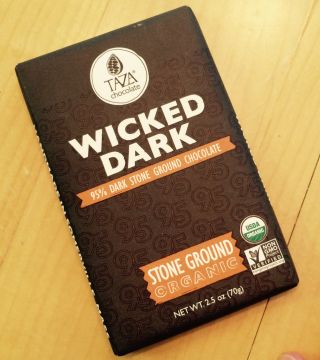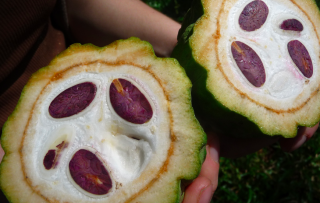Depression
Your Brain on Chocolate
Cocoa has the potential for numerous beneficial effects on the brain.
Posted May 31, 2015

Chocolate, a fermented extract of the seed pods of the Theobroma cacao plant, is one of the world’s most popular foods. Given the caffeine, theobromides, and rich number of flavanols in chocolate, it’s no surprise that cocoa has been used as a medicine for at least 3000 years for varying conditions such as fatigue, rheumatism, and even syphilis*. Could these chemical compounds have a beneficial effect on the brain?
If we look at observational studies tracking chocolate consumption and depression, the outlook is gloomy, with more depressed individuals reporting consuming more servings of chocolate per month. An older study linked consumption of chocolate to a higher suicide rate (1). The quality of chocolate is certainly at issue here…highly active flavanols and caffeine are found in the cocoa itself, so white chocolate will have none, and sweeter milk chocolates have far less beneficial compounds than rich quality dark chocolate. Many chocolate snack products historically contained trans fats, which are linked with detrimental effects in the brain. Other studies have famously linked chocolate consumption with better cognition. Even the number of Nobel Prizes awarded in a country has a positive correlation to the amount of chocolate consumed. These studies are a good example of why observational data is good at tracking trends but can’t tell us anything about causality. Does chocolate cause depression, or is a plate of brownies the first thing you reach for when you are feeling blue? And does coffee make you smarter, or do wealthier countries with higher chocolate consumption have a greater number of Nobel winners?
Controlled trials of cocoa (the unsweetened powdered magic left after the fermentation and drying of the cacao pods) tell us more directly about the effects of chocolate on the brain, and give us the actual mechanism as to why chocolate might be beneficial. First, the flavanols in cocoa (and also many other fruits, berries, coffee, and tea) activate anti-anxiety receptors while caffeine has direct antidepressant effects. That means you get the benefits of a stimulant that is calming at the same time…a calmer energy than caffeine alone.

Cocoa flavanols have also been shown to have anti-inflammatory effects helping all sorts of body systems, reducing blood pressure, reducing measures of inflammation such as C reactive protein, increasing cerebral blood flow, and improving the function of blood vessels, particularly in animal studies. Flavanols seem to enhance signaling to improve neuron regeneration and repair and help long-term memory. They also increase the abiity of the neurons to get fuel and oxygen and to remove waste products better. A randomized trial using a placebo in healthy middle aged human subjects showed the administration of high dose cocoa (500mg of polyphenols) improved mood over the course of 30 days.
In the US, chocolate products are the third highest source of dietary antioxidants, whereas chocolate happy countries like the Netherlands and France get huge amounts of flavanols from cocoa. Dark chocolate has cocoa, some beneficial minerals, and is the way to go if you are rationalizing sweets consumption for better health. A diet rich in all sorts of different polyphenols and flavanols found from eating a rainbow of fruits and vegetables can round out that chocolate consumption and is a safe bet for building and supporting a healthy brain.
*like chocolate, another export from the New World…I recommend penicillin as therapy in lieu of chocolate
(1) Lester D. National consumption of chocolate and rates of personal violence (suicide and homicide) Orthomolecular Medicine. 1991;6(2):81–82
Image Credit: personal photo
Image Credit: flickr creative commons
Copyright Emily Deans MD


